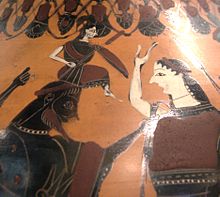Eileithyia
| Eileithyia | |
|---|---|
Goddess of childbirth | |
 The birth of Athena from the head of Zeus, with Eileithyia on the right. | |
| Abode | Mount Olympus |
| Personal information | |
| Parents | Zeus and Hera |
| Siblings | Aeacus, Angelos, Aphrodite, Apollo, Ares, Artemis, Athena, Dionysus, Enyo, Eris, Ersa, Hebe, Helen of Troy, Hephaestus, Heracles, Hermes, Minos, Pandia, Persephone, Perseus, Rhadamanthus, the Graces, the Horae, the Litae, the Muses, the Moirai |
| Children | Sosipolis |
| Roman equivalent | Lucina |
| Part of a series on |
| Ancient Greek religion |
|---|
 |
|
Eileithyia or Ilithyiae or Ilithyia (/ɪlɪˈθaɪ.ə/;[1] Greek: Εἰλείθυια; Ἐλεύθυια (Eleuthyia) in Crete, also Ἐλευθία (Eleuthia) or Ἐλυσία (Elysia) in Laconia and Messene, and Ἐλευθώ (Eleuthō) in literature)[2] was the Greek goddess of childbirth and midwifery.[3] In the cave of Amnisos (Crete) she was related with the annual birth of the divine child, and her cult is connected with Enesidaon (the earth shaker), who was the chthonic aspect of the god Poseidon. It is possible that her cult is related with the cult of Eleusis.[4] In his Seventh Nemean Ode, Pindar refers to her as the maid to or seated beside the Moirai (Fates) and responsible for creating offspring. Her son was Sosipolis, who was worshiped at Elis.[5]
Etymology[]
The earliest form of the name is the Mycenaean Greek